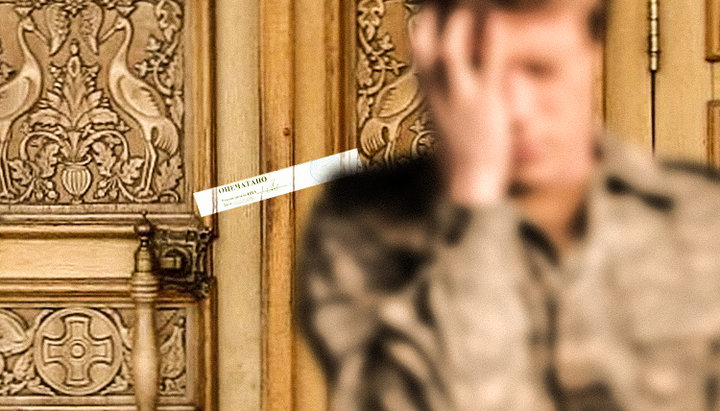They sealed the temple with words: What hell will we burn in for it?

The story of a UOC priest about the interfaith conflict in a Ukrainian village.
Having looked at the heading of these reflections, the reader will probably subconsciously tune to the sacred-mystical meaning of the text. Actually, everything is much simpler.
My story is not read in the ancient annals. It is neither made up nor heard in the stories of saint seers who could see the spiritual world invisible to the human eye. It is modern, about living people whom I have known since childhood but cannot understand their changes and their actions. And it is precisely this that makes the story tragedic and horrible.
It all started not so long ago. The spiritual tragedy of modern times – the church division – reached my native village, the houses (or rather the heads) of fellow villagers, and my temple. People who for decades have not remembered God and His Holy Church, as well as those who visited the church as a funeral home, decided to follow the latest trends of our time – to join the development and promotion of the “newly-established Church” by destroying the One, Holy, Catholic and Apostolic.
In order not to “reinvent the wheel”, they used the way proven over the past months — they held a territorial community meeting, called it a parish one, and decided to change jurisdiction.
People who for decades have not remembered God and His Holy Church decided to join the development of the “newly-established Сhurch” by destroying the One, Holy, Catholic and Apostolic.
People who for decades have not remembered God and His Holy Church decided to join the development of the “newly-established Сhurch” by destroying the One, Holy, Catholic and Apostolic.
This initiative divided the once peaceful and friendly village: people who attended services, trusted the priest, prayed and tried to live a Christian life but did not support the proposal to move to the schism, at once became corrupt, separatists, and traitors.
Those who, at best, “looked in the direction of the temple” at Easter or even less often, felt that they are “masters of life” who can decide who is right and who is wrong, who owns the temple and its property, who has the right to live and pray in the village, and who should go to the neighboring state ...
In a short period of time, it was possible to destroy what had been built by forefathers and multiplied with daily human work and God's help: peace, harmony, mutual respect, and love for each other.
One winter day, disputes and divisions gathered people from “different camps” in the church territory. Some came to illegally take possession of someone else's property, others came to defend what they had been building, maintaining and decorating for decades with their work, feelings, and love. Several clergymen gathered for the spiritual support of the fellow rector. I was one of them.
Disputes arose between people, threats and “television” accusations that had nothing to do with reality sounded. There were also attempts to peacefully resolve the conflict, but this was not achieved due to the speculative decisions taken at the so-called “parish meeting’. Therefore, the way out was an agreement to temporarily close the church in order not to provoke an interfaith conflict.
Thank God that among those present who could decide to seal the doors of the church, there were only two men. All the others were ready to make some noise but not to raise a hand to the shrine.
Therefore, already at the door, nailing the agreement certified with seals and signatures, one of the “patriotic” activists addressed his supporter with the words: “What hell will we burn in for it?”
For me, these words were shocking. On the one hand, they say that somewhere deep down, there are remnants of faith and the fear of God. On the other hand, it is surprising how a person who has these qualities can step over the sacred in order to attain an incomprehensible and unnecessary for him goal (these men have never gone to church and it is not known whether they will do it).
A week later, after the service, my parishioners asked me a question: “What is the blasphemy against the Holy Spirit, which will not be forgiven either in this age or in the age to come?” (Matt. 12, 31-32). Without thinking twice, I immediately gave a true-life example of conscious opposition to the truth.
And what about the village? People pray in the territory of the sealed temple. Personally, it seems to me that these trials only united them. There are not many of them, but they constitute the real, living Body of Christ. They pray, cry, worry, suffer ridicule and contempt. However, God's presence and Christian love are felt in their midst.
But reflecting on those who brought division and hatred to a once friendly and joyful village, the words said by the Savior on the cross come to mind: “Father, forgive them because they do not know what they are doing” (Luke 23, 34).











